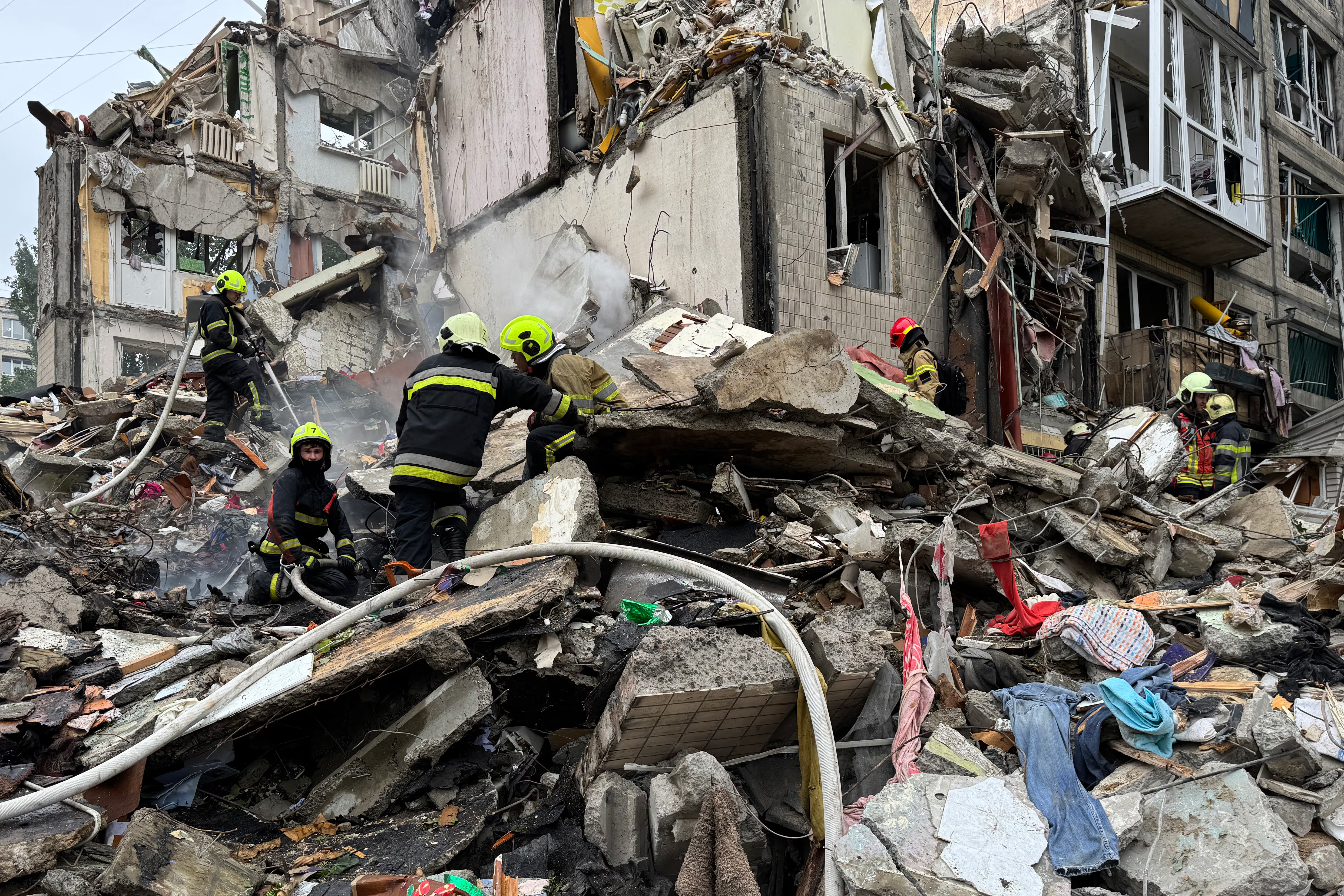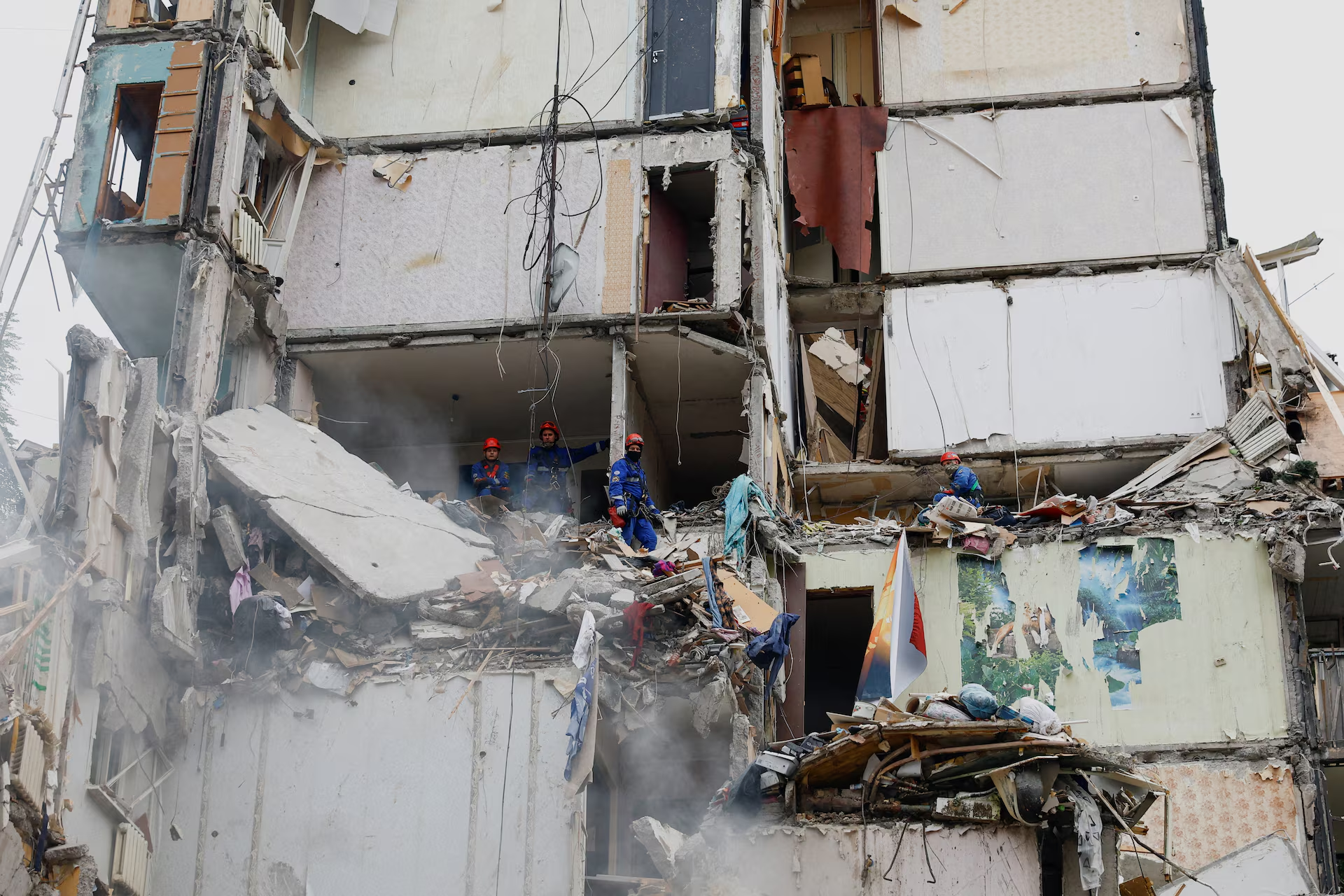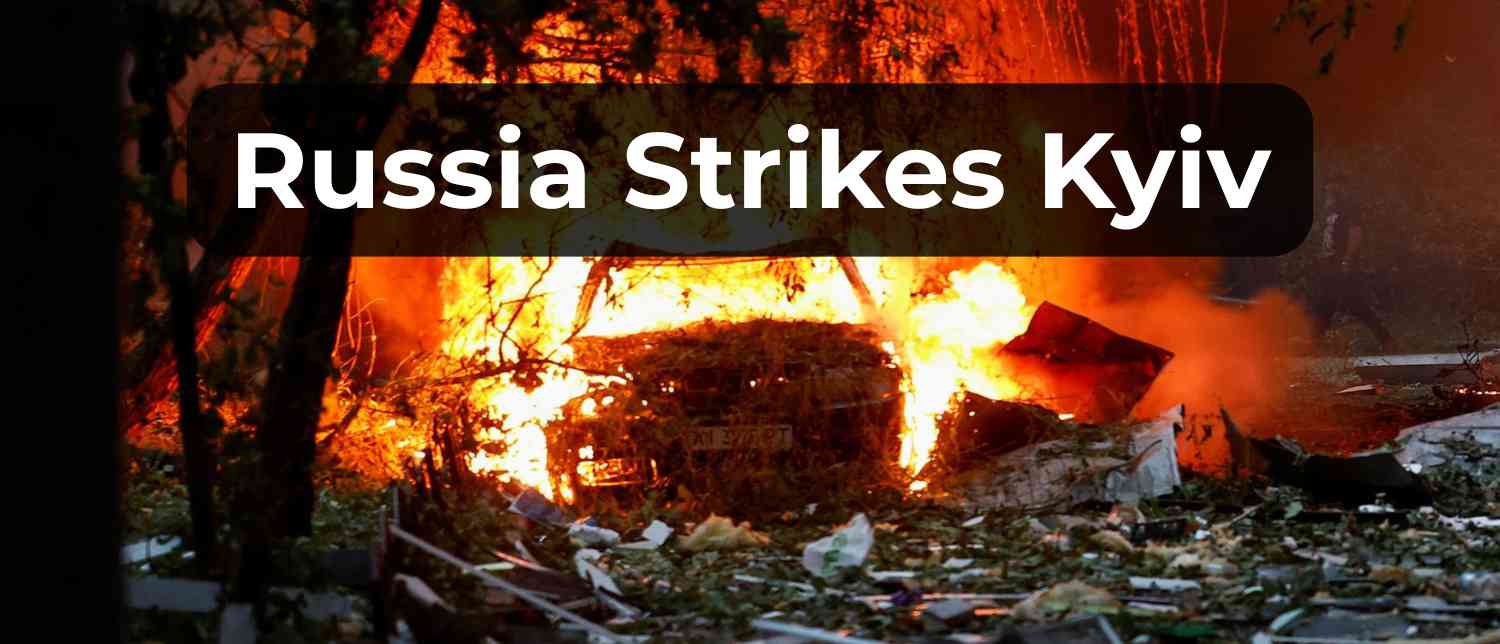In one of the deadliest assaults on the Ukrainian capital since the full-scale invasion began, Russian forces unleashed an unprecedented aerial onslaught during the early hours of July 31, 2025. According to Ukrainian authorities, the overnight attack resulted in the deaths of at least 26 civilians, including three children, and left more than 150 people injured.
The assault involved a staggering 300 drones and eight cruise missiles, targeting densely populated areas of Kyiv, with the Sviatoshynskyi and Solomianskyi districts suffering the most severe destruction. The Ukrainian government has since declared August 1 a Day of Mourning, suspending all entertainment activities and lowering flags to half-mast in remembrance of the victims.

A Night of Horror in Kyiv: Missiles, Drones, and Rubble
As the city slept, air-raid sirens blared through the night sky. At least 27 distinct locations across Kyiv were hit, resulting in widespread devastation. Homes, hospitals, kindergartens, educational institutions, and residential buildings were among the targets—underscoring the indiscriminate nature of the attack.
In the Sviatoshynskyi district, a nine-story residential building was severely damaged and partially collapsed, trapping several residents beneath debris. Emergency rescue operations are still underway as responders work tirelessly to pull survivors from the rubble.
Kyiv's mayor, Vitali Klitschko, described the strike as the deadliest single attack on the city since the start of the war in 2022, particularly emphasizing the unprecedented number of children injured.
Among those confirmed dead was Senior Police Lieutenant Liliia Stepanchuk, whose body was found amid the ruins. Eyewitnesses recounted harrowing moments as windows shattered, walls crumbled, and ceilings caved in during the relentless barrage of explosions.
President Volodymyr Zelensky strongly condemned the attack, describing it as a "treacherous and meticulously planned assault on civilians." He praised first responders and medical personnel who are working around the clock to aid the injured and rescue those still trapped.

Chasiv Yar and the Battle for Truth: Conflicting Claims on Ground Control
Amid the aerial bombardment of Kyiv, Russia claimed to have gained full control over Chasiv Yar, a strategically vital city in the Donetsk region of eastern Ukraine. The claim was met with immediate skepticism and outright denial by Ukrainian military officials, who labeled the announcement as Russian disinformation aimed at manipulating international perception.
Chasiv Yar has long been a flashpoint in the eastern theater of the conflict, with both Ukrainian and Russian forces engaged in intense battles for territorial control. Ukrainian military sources assert that fighting in the area is ongoing, and that Russian troops have not secured full dominance.
This disinformation campaign adds another layer to the already complex information warfare being waged alongside traditional combat operations. It reflects broader efforts by both sides to shape narratives and influence both domestic and global audiences.
The Human Cost: Trauma Beyond the Rubble
Beyond the statistics, the attack on Kyiv has left a profound emotional and psychological scar on its residents. Families have been shattered, communities displaced, and the city’s infrastructure crippled.
Parents who survived the night are now grappling with the trauma of seeing their children injured or worse. Schools and kindergartens—symbols of learning and innocence—now stand in ruins. Hospitals, overwhelmed with casualties, are once again at the forefront of Ukraine's humanitarian crisis.
This latest escalation underscores the brutal reality of war: the targeting of civilians and non-military infrastructure continues unabated, despite international laws that strictly prohibit such actions.
As of now, as a result of Russia’s terror attack on Kyiv, 16 people have been killed, including 2 children and one policeman. Over 150 have been injured, including 16 children and 6 policemen.
Unimaginable scale of terror and brutality.
Rescue and recovery operations are still… https://t.co/KipaDXMK2n— Volodymyr Zelenskyy / Володимир Зеленський (@ZelenskyyUa) July 31, 2025
A War That Shows No Sign of Slowing
The conflict in Ukraine, now well into its fourth year, has evolved into a war of attrition marked by frequent missile strikes, drone attacks, and urban warfare. Russia's renewed offensive in the Donetsk and Luhansk regions is a clear signal that a military resolution remains elusive.
While international diplomats continue to call for restraint and peace negotiations, retaliatory attacks and escalating violence suggest that both sides are entrenched in their positions. Sanctions, summits, and UN resolutions have so far failed to bring about a lasting ceasefire.
Each new attack further complicates diplomatic efforts, raising the stakes and pushing any hope of peaceful resolution further into the distance.
International Response and the Call for Accountability
Following the July 31 attack, global leaders issued strong condemnations. Human rights organizations renewed calls for investigations into potential war crimes committed by Russian forces, particularly regarding the deliberate targeting of civilian areas.
There are growing demands from the international community for Russia to respect international humanitarian law and cease attacks on civilian populations. Meanwhile, aid organizations are mobilizing resources to support the victims, with special focus on displaced families and injured children.
As the humanitarian crisis deepens, the need for coordinated international action is more urgent than ever.
Horrific night in Kyiv. At least 6 killed, including a 6-year-old child, and over 30 injured after Russia’s brutal attack. Emergency crews are still clearing the rubble.
Russia mustn’t go unpunished. It must be held accountable for every life taken and future destroyed. pic.twitter.com/A7R8MbSRus— Andriy Kostin (@AndriyKostinUa) July 31, 2025
August 1: A Day of Mourning and Reflection in Ukraine
In honor of those killed, the Ukrainian government declared August 1 a national Day of Mourning. This solemn day saw the suspension of all entertainment events, public gatherings, and commercial festivities. Flags across the nation were flown at half-staff, and candlelight vigils were held in cities from Lviv to Kharkiv.
The Day of Mourning served not only as a moment of remembrance but also as a stark reminder of the ongoing human toll of the conflict. It was a collective act of national grief and resilience—a testament to the spirit of a people determined to endure, even in the face of relentless adversity.
A Global Plea: End the Violence, Protect the Innocent
The mass casualties and destruction in Kyiv have reignited global conversations about the ethics of modern warfare and the urgent need to protect civilians in conflict zones. The deliberate targeting of residential areas, hospitals, and schools is a flagrant violation of international norms and must be met with accountability.
As the world watches, there is a growing consensus that violence only begets more violence. True peace can only be achieved through empathy, honest dialogue, and a commitment to human dignity. The suffering of children, the elderly, and innocent families must become a catalyst for meaningful diplomatic action, not just words.
🇷🇺 Last night, Russia launched another brutal missile attack on Kyiv.
🕯️ 9 people are confirmed dead.
💔 Over 100 injured.
🧸 Among them: a 6-year-old boy.
This is not a military operation.
It is daily, deliberate terror against civilians.
🛑 These children are being robbed of… pic.twitter.com/e8ehabRYgB— Mariam Lambert : CEO Emile Foundation (@Mariam__Lambert) July 31, 2025
A Wake-Up Call to Humanity
The July 31 strike on Kyiv is more than just another chapter in this prolonged war—it is a wake-up call to the world. The horrific images of destroyed homes, wounded children, and grieving families are not just statistics or headlines. They are a call to conscience.
It is time for the international community to step beyond rhetoric and demand a ceasefire, renewed peace negotiations, and accountability for crimes against humanity. As Ukraine mourns its dead, let this moment be a turning point—one that reminds us that every life lost to war is a failure of humanity.
With inputs from agencies
Image Source: Multiple agencies
© Copyright 2025. All Rights Reserved. Powered by Vygr Media.

























